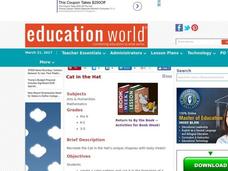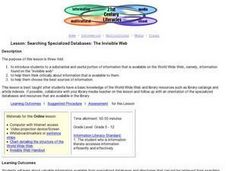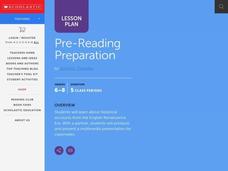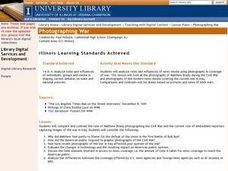Curated OER
Where Did Foods Originate? (Foods of the New World and Old World)
What do papayas, peanuts, pineapples, and potatoes have in common? Why, they are foods explorers brought back to the Old World. Young researchers use the Internet to investigate how New World explorers helped change the Old World's diet....
Curated OER
Telling the Blue Angels Story
High schoolers use the internet to research a recent Blue Angels plane crash. As a class, they list the various ways journalists list the facts of an incident and which one is most effective given different scenerios. They write a story...
Curated OER
Looking at Lewis and Clark
Fifth graders review information on Lewis and Clark by using a variety of resources. With partners, they travel between stations researching different information based on the expedition. They check each others work and share it with the...
Curated OER
Treasure Hunters
Students design an on campus treasure hunt to find various architectural vocabulary words which they then create definitions for on the blog page on the Environmental Design website.
Curated OER
Creating Context Mural
students examine the historical, political, religious and culture aspects of the Renaissance. Using this information, they read "Galileo" by Bertolt Brecht. They use the internet to research a specific event of the time period and come...
Curated OER
Cat in the Hat
Explore the book The Cat in the Hat by Dr. Seuss with your class. They will design a pattern for the cat's hat. They will create color pattern designs with candy and frosting. In the end, they will describe their pattern.
Curated OER
People of the US
Students use a hot list to research a famous person. They make a presentation displaying five things about that famous person. Students research what impact that famous person had on US history. They make a presentation to present before...
Curated OER
The age of majority: How old is old enough?
Young scholars research on the Web and in books the "age of majority" in general and how it applies in their particular states. Explore, too, "emancipation" and whether this is another way for teens to earn additional rights. Students...
Curated OER
Voter Fraud: Are Ghosts Going To The Polls
Students research background material about voting in their community. They interview local/county election officials to see what is going on in the community. They also interview teachers, and students to determine if they are newly...
Curated OER
Laura Bush
Students read an article about First Lady, Laura Bush's visit to the Midway Atoll, in which she was hoping to focus attention on preserving wild places. They discuss what role they think First Ladies should play while their husbands are...
Alabama Learning Exchange
Going Batty
Second graders participate in a research project involving bats. They collect information for their project on the Internet and other educational sites. They participate in a field trip to discover more about bats at the zoo.
Curated OER
What Death Brings to Life (Teen Living Component)
Students research and discuss many common characteristics of modern cultures and examine ancient cultures for comparison. They study the components of anthropology and ethnocentrism.
Curated OER
Searching Specialized Databases: The Invisible Web
Learners examine the useful information to be found on the "invisible web." They find the best sources of relevant information.
Curated OER
Code Breaking
Students explore symbolism and examine various types of codes, including those used in the Civil War, which use/d mathematical symbols and language. They create and break various codes.
Curated OER
The World's Ten Greatest Inventions
Students review a list of important inventions from the last century and a half. They order the top ten inventions with an explanation accompanying their choices and then write a report on a selected invention.
Curated OER
Word Picture - Communicating Visually
Students examine how words and visual images are used to influence people. They choose a word to illustrate using both lettering and visual images. They present their work and it is critiqued by a peer review.
Curated OER
Elders as Resources
Students participate in an oral history project where they interview a person's valuable insights to their life stories. They gain personal experience in an interactive process that brings history alive all over again. Students conduct...
Curated OER
Strategic Skill: Evaluating Information Quality Using Electronic Sources
Fourth graders review and complete evaluating information quality. In groups, they research the diversity of the numerous Native American tribes in Montana. They complete a worksheet on evaluating sources on the Internet and share...
Curated OER
Quality of Information: Point of View and Bias
Fifth graders identify stereotypes of Indian people based on perceived characteristics. They discuss the misconceptions. Students define quality of information and give an example from the story "Seaman's Journal: On The Trail With Lewis...
Curated OER
The Importance of Plants to Native Cultures in the Past and Present
Eighth graders investigate the founding and history of Sluice Boxes State Park. They use both primary and secondary resources to collect data. The focus is upon the use of native plants to make medicines. They write reports about several...
Curated OER
Who's Who and How Do You Know for Sure?
Students investigate the applications of DNA fingerprinting, They read crime scenarios and using the details of the crime and laboratory experimentation decide the suspects guilt or innocence.
Curated OER
Pre-Reading Preparation
Learners explore a given historical fiction story. In groups, they research selected topics dealing with the story and determine what is fiction and what is fact. Students create a multimedia presentation about their findings and...
Curated OER
Photographing War
Students examine the role of Matthew Brady photographing the Civil War and compare it with the role of photographers embedded in the War in Iraq.
Curated OER
Mr./Ms.Scientist, This Is Your Life
Students create a timeline of ten events in chronological order about a scientist to include his/her accomplishments.

























